Siedlerkolonialismus
Ideologie, Gewalt und Gerechtigkeit
Buchvorstellung
Why did antisemitism, which for centuries had been a justification for persecution of Jews, become a justification for genocide from 1939 to 1945? In "When Antisemitism Became Genocidal: The 'Jewish Enemy' in Nazi Propaganda during World War II and the Holocaust," Jeffrey Herf draws on his 2006 work, 'The Jewish Enemy: Nazi Propaganda during World War II and the Holocaust' to examine how the Nazi's antisemitic interpretation of World War II justified policies of mass murder. At the core of that propaganda, presented in newspapers, posters, and statements made on the radio, the Nazi leadership claimed that the anti-Hitler coalition led by the United States, Great Britain and the Soviet Union was directed by an international Jewish conspiracy. The purpose of what the Nazis denounced as "the Jewish war" was to exterminate, that is, murder, the German people. Hitler, Goebbels and others repeatedly and in public asserted that as a massive act of national self-defense, the Nazi regime would "exterminate" and "annihilate" the "Jewish race in Europe." Despite decades of excellent scholarship on the Nazi regime and the Holocaust, 'The Jewish Enemy', published in 2006, was the most detailed and comprehensive examination of the connection between this propaganda, the war and the Holocaust.
Jeffrey Herf is Distinguished University Professor in the Department of History at the University of Maryland, College Park where, since 2000, he has taught Modern European, especially German history in the twentieth century. His publications include Undeclared Wars with Israel: East Germany and the West German Radical Left, 1967-1989 (Cambridge University Press, 2016), published in Germany by Wallstein Verlag in 2019 as Unerklärte Kriege gegen Israel; Nazi Propaganda for the Arab World (Yale University Press, 2009; The Jewish Enemy: Nazi Propaganda during World War II and the Holocaust (Harvard University Press, 2006), and Reactionary Modernism: Technology, Culture and Politics in Weimar and the Third Reich (Cambridge University Press, 1984). In 2017 with Anthony McElligott, he co-edited Antisemitism Before and Since the Holocaust: Altered Contexts and Recent Perspectives (Palgrave Macmillan). His book Israel’s Moment: International Support for and Opposition to Establishing the Jewish State, 1945-1949 is forthcoming with Cambridge University Press in early 2022.

Die Veranstaltung ist Teil der Reihe Erinnern als höchste Form des Vergessens?
Ideologie, Gewalt und Gerechtigkeit
Buchvorstellung
Irans Einfluss in Deutschland
Vortrag
Vortrag
Buchvorstellung
Der „progressive“ Angriff auf Israel, Judentum und Holocausterinnerung
Buchvorstellung
Wie das Völkerrecht gegen Israel missbraucht wird
Vortrag
Wie das Völkerrecht gegen Israel missbraucht wird
Buchvorstellung
Wie das Völkerrecht gegen Israel missbraucht wird
Vortrag
Sklaverei, bürgerliche Gesellschaft, Nationalsozialismus - und heute?
Bildungsurlaub
Philosophische Perspektiven auf das gute Leben
Bildungsurlaub
Geschichte und Gegenwart des Judenhasses
Bildungsurlaub

Die Veranstaltung ist Teil der Reihe Erinnern als höchste Form des Vergessens?
Mitglied werden: vorstand@kritischebildung.de